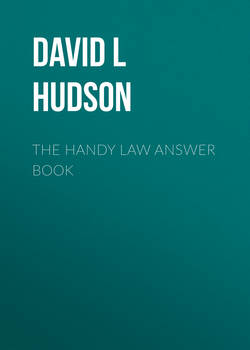Читать книгу The Handy Law Answer Book - David L Hudson - Страница 182
На сайте Литреса книга снята с продажи.
What did the Court decide with respect to criminal three-strikes laws?
ОглавлениеThe U.S. Supreme Court upheld California’s Career Criminal Punishment Act (also known as the “three strikes” law) sentencing law in Ewing v. California (2003) and Lockyer v. Andrade (2003). Under the California law, if a criminal defendant is convicted of at least three felonies, he is subject to the three-strikes law which carries a penalty of 25 years to life.
The cases involved Gary Ewing who stole three golf clubs and Leandro Andrade, who stole $150 worth of videotapes. However, both defendants had multiple criminal convictions in their past, including burglaries, that made them eligible as recidivist offenders under the state law. They challenged their sentences and the three-strikes law as a violation of the Eighth Amendment’s cruel and unusual punishment clause.
In Roper v. Simmons the Supreme Court ruled that inmates who committed their crimes while they were legally juveniles cannot be executed for said crimes (iStock).
The Court rejected the argument that the defendants’ sentences violated the Eighth Amendment’s prohibition against cruel and unusual punishment. “The gross disproportionality principle reserves a constitutional violation for only the extraordinary case,” Justice Sandra Day O’Connor wrote for the Court in Andrade. In her Ewing opinion, Justice O’Connor explained that states have the right to pass laws protecting the public from career criminals: “When the California Legislature enacted the three strikes law, it made a judgment that protecting the public safety requires incapacitating criminals who have already been convicted of at least one serious or violent crime. Nothing in the Eighth Amendment prohibits California from making that choice.” She also cited statistics showing that a disturbing number of inmates committed repeat offenses upon release from incarceration.
LegalSpeak: Griswold v. Connecticut (1965)
Justice Arthur Goldberg (concurring): “The Ninth Amendment reads, “The enumeration in the Constitution, of certain rights, shall not be construed to deny or disparage others retained by the people.” The Amendment is almost entirely the work of James Madison. It was introduced in Congress by him and passed the House and Senate with little or no debate and virtually no change in language. It was proffered to quiet expressed fears that a bill of specifically enumerated rights could not be sufficiently broad to cover all essential rights and that the specific mention of certain rights would be interpreted as a denial that others were protected…. The Ninth Amendment to the Constitution may be regarded by some as a recent discovery and may be forgotten by others, but since 1791 it has been a basic part of the Constitution which we are sworn to uphold. To hold that a right so basic and fundamental and so deep-rooted in our society as the right of privacy in marriage may be infringed because that right is not guaranteed in so many words by the first eight amendments to the Constitution is to ignore the Ninth Amendment and to give it no effect whatsoever.”
